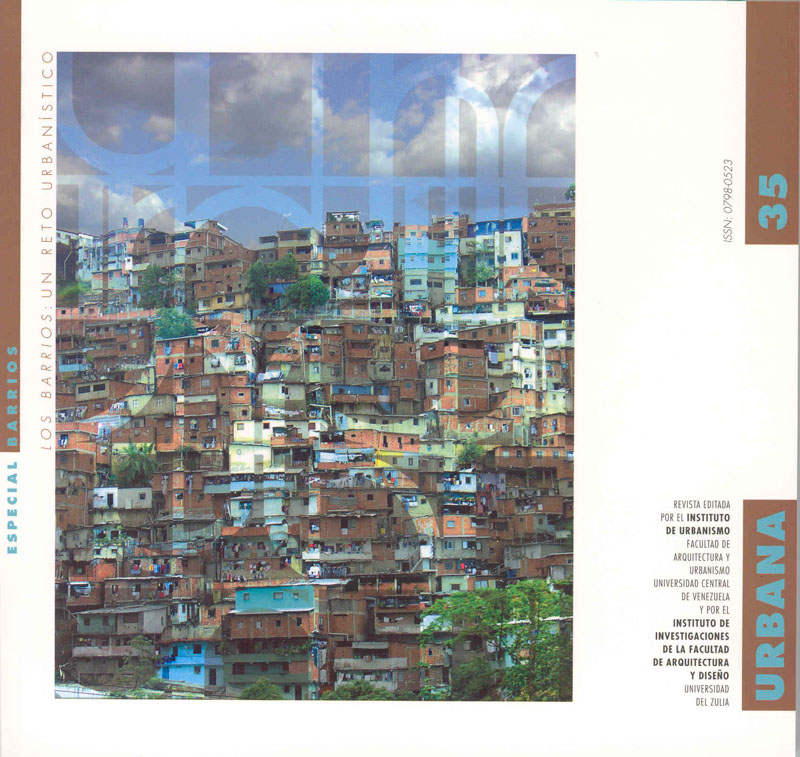Las Politicas de Vivienda y Desarrollo Urbano frente al Desafió Urbanístico de las "Zonas de Barrios".
Palabras clave:
Zonas de barrios, Políticas de Vivienda, Desarrollo Urbano, Estructura institucional, Restricciones económicas. Neighborhood áreas, Housing Policies, Urban Development, Institutional Structures, Economic retrictions.Resumen
RESUMEN
En Venezuela, los interrogantes cruciales que discuten los especialistas en el tema del alojamiento se pueden reducir a dos: ¿Por qué el 50% o más, de la población urbana venezolana vive en “zonas de barrios”? y, ¿Si se cree contar con una batería de explicaciones y políticas bien sustentadas, porque la situación no mejora, sino que parece empeorar? Es probable que si nos detenemos a analizar la situación más allá de la reducida perspectiva sectorial especifica de la vivienda y el desarrollo urbano, aparecerían nuevas determinantes, y quizá no sería cierta la premisa de la segunda pregunta. Podría ser que no existen explicaciones bien sustentadas y que las políticas de acción tengan deficiencias.
Las políticas, programas y actuaciones en vivienda y desarrollo urbanístico de organismos como el Banco Obrero, Instituto Nacional de Vivienda, Consejo Nacional de la Vivienda y otros con miras a resolver los problemas de los “ranchos”, son testimonios concretos que deberían dar pie a nuevas reflexiones, para confirmar o desechar las hipótesis elaboradas hasta el momento, para evaluar la pertinencia y viabilidad de las políticas de viviendas aplicadas en el pasado y en el presente, y determinar cuáles fallas son imputables directamente a una determinada política de vivienda y cuales hay que buscarlas fuera del ámbito sectorial especifico del hábitat.
Es esta reflexión se avanzan algunas ideas acerca de cuál política entre las muchas aplicadas y otras solo esbozadas, sería la adecuada en materia de vivienda y el desarrollo urbano, en un contexto actual de dificultades económicas.
ABSTRACT
In Venezuela, the crucial queries in the housing topic that specialists discuss are condensed in this two: ¿Why 50% or more, of the Venezuelan urban population live in “neighborhood áreas”? And, if one believes to have a battery of policies and well sustained explanations, ¿why doesn’t the situation improve, but rather it seems to worsen? It is probable that if we stop to analyze the situation beyond the reduced specific sectorial perspective of the housing and urban development, new determinants would appear, and maybe the premise of the second question would not be certain. It could be that well sustained explanations don’t exist and that the action policies have deficiencies.
The policies, programs and performances in housing and urbanistic development of organisms such as Banco Obrero, Instituto Nacional de la Vivienda, Consejo Nacional de la Vivienda and others, trying to solve the problem of the “huts”, are concrete testimonies that should give cause to new reflections, to confirmo r to discard the hypotheses elaborated, to evaluate the relevancy and viability of the housing policies applied in the past and present, and to determine which flaws are attributable directly to a certain housing policy and, which do we have to look for outside the specific sectorial environment of the hábitat.
In the present reflection we consider some ideas about which policies regarding housing and the urban development- among the many sketched and/ or applied – would be, in the current context of economic diffculties, the appropriate one.

